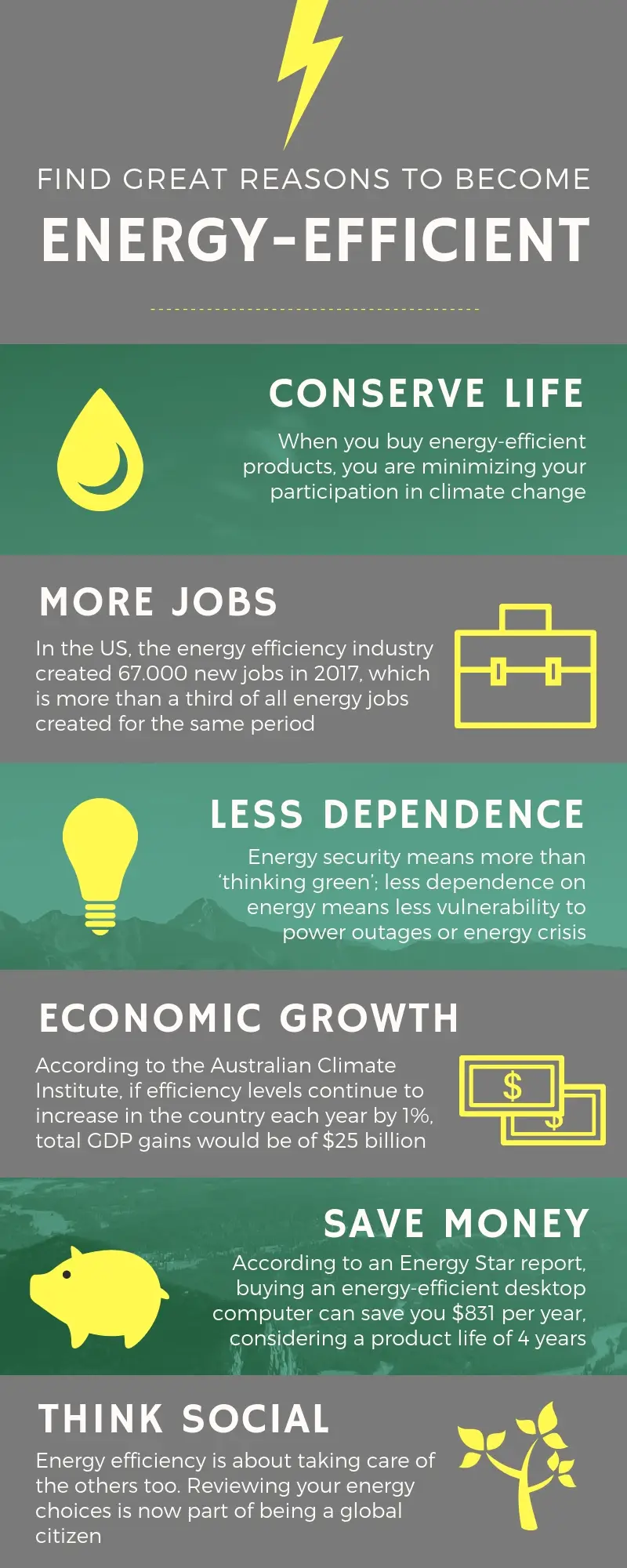Top 10 reasons to be energy-efficient
From solar panels to wind turbines, people everywhere have something to say about energy efficiency and the ability to become more energy-efficient. You don’t even have to look that far; if you buy a minifridge or even an LED light bulb, you will notice a label describing each product’s energy consumption details.
“But why should I care?” you must be thinking.
Well, there are two reasons: You’re helping to conserve the planet and, yes, saving money while doing it. The equation is right in front of you, and with a smart use of energy supplies, anyone can make a positive financial impact, such as increasing your property value and even creating more jobs.
Even the United Nations has been talking about it. Energy efficiency is one of the U.N.’s main Sustainable Development Goals for the next few decades, and it is becoming a top concern for governments, companies and individuals who want to make a change in the world.
Whether on a small or large scale, there are multiple reasons to bring energy efficiency into your daily life. Here are the top 10 reasons to be energy-efficient.
- There are multiple reasons to bring energy efficiency into your daily life (Jon Tyson on Unsplash)
What is energy efficiency, and why is it so relevant?
Before we jump in, it’s important to know that being energy-efficient isn’t only about “going green” or reducing your electricity bill. The main goal is to manage the energy you need to live —whether it’s solar, wind power, electrical, geothermal and so on — in a better way.
From big industries to small apartments, there are many opportunities to save energy in your day-to-day life. Some of them can be not only affordable, but also easier than you might think, while still having a major impact.
According to Natural Resources Canada (NRCAN), Canadians saved $38.5 billion on their energy bills in 2014, as a result of energy efficiency improvements since 1990, which is equivalent of approximately 2.1 percent of the country’s GDP.
1. Save money
In Canada, energy use between 1990 and 2014 rose 31 percent, but this percentage would have been much higher (around 55 percent) without energy efficiency improvements. According to NRCAN, the Energy Efficiency Program achieved $1 billion in cost savings between 2011 and 2015 for Canadian consumers and companies.
These huge numbers sound interesting, but what do they have to say about each individual’s residential energy costs? According to the 2016 Energy Star Annual Report, buying an energy-efficient desktop computer can save you $831 per year, considering an estimated product life of four years.
Thus, when you decide to buy an energy-efficient LED light bulb over a normal one, you are actually saving money. If you expand that to all of the electronic devices within your house, you could be reducing your bills dramatically.
In other words, being energy-efficient allows you to reallocate a great amount of the money you spend on energy to something like family vacations or, that new TV you’ve been saving for.
According to the European Covenant of Mayors, for each 1 euro spent on energy-efficient renovations, people can get up to 5 euros in returned savings and value within the year. It sounds like a good deal, doesn’t it?
- Here are the top 10 reasons to be energy-efficient (Photo: Kody Gautier on Unsplash)
2. Help the environment (and your health)
It doesn’t matter who you are, you will leave a carbon footprint on the planet. However, we can find ways of minimizing our impact on nature by being energy-efficient.
For some people, this may sound like a call to find clean and renewable energy, but it is possible to reduce your participation in climate change without having to rely only on wind power or any other green energy source.
Solar and wind energy options still may vary based on where you live, but you can start now, for example, by choosing to buy Energy Star-certified products. According to the United States Environmental Protection Agency (EPA), Energy Star is helping the world to reduce carbon pollution by 2 billion metric tons.
A sustainable use of energy is not only related to the environment. It can also have an impact on your personal health.
As reported by the World Health Organization (WHO), 4.2 million people die every year as a result of exposure to outdoor air pollution, while 3.8 million die every year due to household exposure to smoke from dirty cookstoves and fuels.
Every little change you make in order to become energy-efficient can bring positive effects to other people’s lives, especially by having in mind that 91 percent of the world’s population lives in places where air quality exceeds WHO guideline limits.
3. Comfortable living
If saving money or the environment is not enough incentive, the convenience of a more comfortable house will probably persuade you to take a deeper look at energy efficiency.
Automated lighting, programmable thermostats, double-paned windows and insulation are only some of the ways that you can improve your comfort while being energy-efficient.
As you make these changes at home, you will feel less exposed to weather variations. Also, an energy-efficient residence can be extra convenient depending on how automated it is.
Sensors and smart plugs will not only save your money; they will also make your life easier. Imagine never having to think again about whether you left the lights on.
4. More jobs being created
The energy industry has gone through some major transformations in recent years. As the fossil fuel industry has been working hard to recover completely from the oil crisis since 2015, energy efficiency has become more profitable, providing an interesting opportunity for big companies.
According to the U.S. Senate Committee on Energy & Natural Resources, the energy efficiency industry created 67.000 new jobs in the United States in 2017, which is more than a third of all energy jobs created nationally over the same period.
The job market for energy efficiency is moving in such a way that American firms expect a 9 percent employment growth for 2018, while overall employers project an expansion of 6.2 percent, as stated by the 2018 U.S. Energy and Employment Report.
Alongside jobs directly related to energy efficiency, a whole world of opportunities tends to rise, such as research projects, services, and new products.
Even if you are not interested in working for the energy industry, just by being energy-efficient you will help the job market and possibly even your own community in becoming prosperous.
5. Increase your property value
Cha-Ching. Having your property certified energy-efficient will save you money, improve your health, bring you more convenience and, yes, it will even increase the value of your home in the local housing market.
In 2013, the United Kingdom’s Department of Energy and Climate Change published some great news for energy efficiency enthusiasts. According to national research, making energy improvements to your property could increase its value by 14 percent on average, and up to 38 percent in some parts of England.
As stated by The Guardian, 70 percent of the people interviewed for a British survey affirmed that they would try to renegotiate the price of a property if they discovered it was inefficient.
Also in the U.K., residents can rate their houses’ energy efficiency by applying for an Energy Performance Certificate (EPC), which basically measures the amount of energy used per square meter and the level of CO2 emissions per year. The rating on a scale of 100 demonstrates how energy-efficient your home is by providing a higher rating for those that are very efficient (in the 80 to 100 range) and a lower rating for those that could use some upgrades.
In Canada, homeowners can register with EnerGuide to rate their property’s efficiency. Essentially, the EnerGuide label shows you how efficient your home is and allows you to compare against similar homes across Canada. The program labels energy use in each house in gigajoules (GJ) per year. The closer to zero, the more efficient it is.
As reported on the City of Edmonton (Alberta) website, each 1 point improvement on the EnerGuide rating scale typically reduces a home’s energy consumption by 3-5 percent.
6. Protect yourself from rising energy prices
Going energy-efficient will save you money in many ways. Most importantly, you will be less vulnerable to price changes in everyday utilities like electricity and natural gas.
In the province of Ontario, Canada, the expectations are that household electricity prices will rise 52 percent from 2017 to 2035, according to a story published by the Financial Post.
Even Alberta, known for its lower energy bills — at least in comparison with Ontario — has recently faced some increases in the electricity prices.
Price raises are never a welcome site for consumers, but if you are an energy-efficient person … OK, they’re still not great, but you will surely feel less impact on your bill at the end of the month.
- You can be less vulnerable to price changes in everyday utilities like electricity and natural gas (Photo: rawpixel on Unsplash)
7. Better prepared for the future
The world is changing, and making an effort to become more energy-efficient. This is not only about saving an extra few dollars in your wallet, but it is also part of a whole cultural shift.
As the global population (including authorities) grow increasingly concerned about climate change and the way we handle Earth’s resources, people tend to raise awareness on the need to use energy in a smart way.
One of the United Nations’ Sustainable Development Goals is ensuring access to affordable, reliable and modern energy by 2030, which includes:
- Affordable and clean energy
- Sustainable cities and communities
- Responsible consumption and production
- Climate action
- Life on land
- Use only energy efficient appliances and light bulbs
These U.N. guidelines are not random, they are suggestions designed to turn the world into a more sustainable, equal place for all. And you know, you probably don’t want to be that one neighbor known for irresponsibly wasting energy.
8. Economic growth
A resilient economy is made of innovation, job creation and sustainability, of which energy efficiency is a huge part.
As reported by The Huffington Post, businesses are starting to discover that energy efficiency can be as profitable as the renewable energy industry. Actually, some companies have found out that energy efficiency investments provide a higher and faster return on investment (ROI).
When you think about a country’s GDP, this economic growth is outstanding. According to the Australian Climate Institute, if energy-efficiency levels continue to increase in the country each year by 1 additional percentage point, total real GDP gains could be upwards of 25 billion Australian dollars.
- Energy efficiency can bring more innovation, job creation and sustainability (Photo: Kyle Ryan on Unsplash)
In Canada, the NRCAN states that industrial energy efficiency in the country can be further improved by as much as 20 percent or more.
This would reduce energy costs considerably, especially in the industrial sector. After all, industries account for 38 percent of secondary energy use and 34 percent of related greenhouse gas emissions, according to the Office of Energy Efficiency.
As new energy efficient initiatives get stronger, people can also expect a rise in the number of students in the energy sector. Scientists always have an eye on trending technologies, so universities will be positively impacted by investing in the innovation of energy efficiency research.
9. Social responsibility
As the whole world struggles to fight inequality and the dangerous consequences of climate change, social responsibility is more important than ever before.
Energy efficiency can be about comfort, saving money or even increasing your property value, which is always great. However, it is also about taking care of the others.
Reviewing your energy choices is now part of being a global citizen.
For corporations, this is an even bigger issue. As the concept of Corporate Social Responsibility (CSR) grows, companies tend to address environmental and social challenges on a larger scale.
It is not by coincidence that so many corporations are talking about inequality, environmental issues, or the lack of diversity in the business world. This trend is totally related to the impact such challenges have on the world and on their own businesses.
- 55% of consumers will pay extra for products from companies committed to positive social impact (Photo: rawpixel on Unsplash)
The million-dollar question is not “how do we grow?” anymore, but how do we grow while having a better impact on society?.”
Such conversations are actually being led by normal people like you and me. According to a 2014 Nielsen survey, 67 percent of people around the world prefer to work for socially responsible companies.
Even when it comes to money, the results show that 55 percent of consumers will pay extra for products and services from companies committed to positive social and environmental impact.
As reported by the same Nielsen survey, top concerns for consumers are increasing access to clean water, improving access to sanitation, and ensuring environmental sustainability.
10. Reduce your dependence
To become energy-efficient, you don’t need to completely change your routine, get rid of electricity and rely on geothermal or biomass energy only — and no, you don’t need to sell your belongings and go live in the woods.
Of course, these clean resources are great, but energy security means more than “‘thinking green.” When you get less dependent on energy, you also become less vulnerable to power outages or any possible energy crises that may come up.
According to a study by the Covenant of Mayors in Europe, 80 percent of energy consumption in Europe is linked to urban activity. The research also states that people living in cities are exposed to higher risks of electricity cuts and fuel poverty.
- Rethinking how we waste energy will make our communities more resilient (Photo: Canva)
To work on this issue, the European Commission developed a plan in 2014 to improve its energy security. Some of their main strategies were:
- Increasing energy efficiency and reaching the proposed 2030 energy and climate goals
- Helping consumers lower their energy consumption by using clear billing information and smart energy meters
- Further deployment of renewables, sustainable production of fossil fuels and safe nuclear energy
- Strengthening emergency and solidarity mechanisms and protecting critical infrastructure
Rethinking how we waste energy each and every day will make our homes and communities more resilient.
In case of emergencies such as earthquakes or tornadoes, for example, energy-efficient families will probably be more prepared to handle the situation than those families who rely on high amounts of energy for everything they do.




















